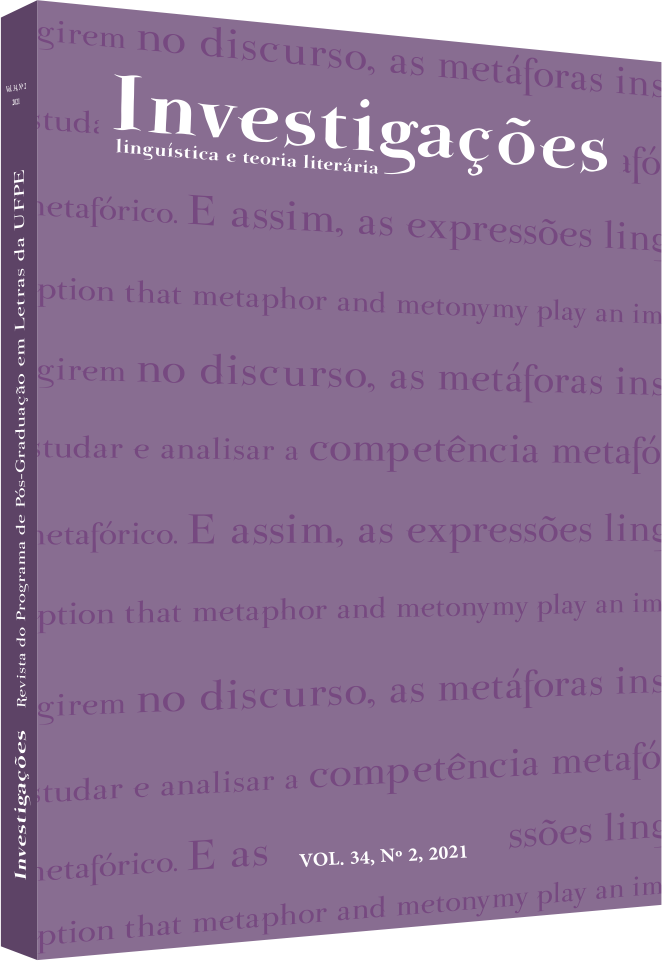“Vamos falar do tempo?”: uma análise da evolução do gênero discursivo previsão do tempo
DOI:
https://doi.org/10.51359/2175-294x.2021.250819Keywords:
discoursive genre, style, forecast weather.Abstract
This study aims to investigate how the forecast weather discursive genre changed in a news television program. For this purpose, three utterances were selected from 1976, 1991, and 2019, and analyzed based on Bakhtin Circle studies in relation to a discoursive genre view. The analyses indicated some new elements added as much in the compositional structure as stylistics, such as: an informal presentation owing to a direct participation of the audience, and a large use of technology to show the data related to the weather forecast.References
ACOSTA PEREIRA, Rodrigo. O gênero carta de conselhos em revistas online: na fronteira entre o entretenimento e a autoajuda. 2012. 259 p. Tese (Doutorado em Linguística). Universidade Federal de Santa Catarina, Florianópolis, SC, 2012.
BAKHTIN, Mikhail. Os gêneros do discurso. São Paulo: Editora 34, 2016[1953].
BAKHTIN, Mikhail. Problemas da poética de Dostoiévski. Rio de Janeiro: Forense Universitária, 1981.
BRAIT, Beth. Olhar e ler: verbo-visualidade em perspectiva dialógica. Bakhtiniana, São Paulo, v. 8, p. 43-66, jul-dez. 2013.
JENKINS, Henry. Cultura da Convergência. 2. ed. São Paulo: Aleph, 2009.
JORGE, Alexandre. 1991. 2011. (4m02s). Youtube. Disponível em:
https://www.youtube.com/watch?v=J3N8b0fYaQs. Acesso em: 13 jan. 2019.
Os acontecimentos em todo o Brasil & no mundo (canal). Previsão do tempo - 12/01/2019. 2019. (2m46s). Youtube. Disponível em:
https://www.youtube.com/watch?v=I99QxRBdaik. Acesso em: 13 jan. 2019.
MEMORIAL GLOBO. Apresentadores do Tempo. Disponível em:
https://memoriaglobo.globo.com/jornalismo/jornalismo-e-telejornais/jornalnacional/apresentadores/apresentadores-do-mapa-tempo/. Acesso em: 10 mar. 2021.
Meteorologia: a ciência da atmosfera. IAG-USP. Disponível em:
https://www.iag.usp.br/siae97/meteo.htm. Acesso em: 19 out. 2021.
MOTA-ROTH, Désirée. (Orgs.). Gêneros: teorias, métodos e debates. São Paulo: Parábola Editorial, p. 152-183, 2005.
MOURA, A.D. Evolução da meteorologia: da Babilônia aos nossos dias. Revista Brasileira Tecnologia, Rio de Janeiro, v. 17, n. 1, p. 05-14, fev. 1986.
RODRIGUES, Rosângela Hammes. A constituição e o funcionamento do gênero jornalístico artigo: cronotopo e dialogismo. Tese (Doutorado em Lingüística Aplicada e Estudos da Linguagem) - Programa de Estudos Pós-Graduados em Lingüística Aplicada e Estudos da Linguagem (LAEL), Pontifícia Universidade Católica de São Paulo, São Paulo, p. 347, 2001.
RODRIGUES, Rosângela Hammes. Os gêneros do discurso na perspectiva dialógica da linguagem: a abordagem de Bakhtin. In: MEURER, José Luiz; BONINI, Adair; ROJO, Roxane. Gêneros do discurso e gêneros textuais: questões teóricas e aplicadas. In: MEURER, José Luiz; BONINI, Adair; MOTA-ROTH, Désirée. (Orgs.). Gêneros: teorias, métodos e debates. São Paulo: Parábola Editorial, 2005.
ROJO, Roxane. Gêneros discursivos do Círculo de Bakhtin e multiletramentos. In: ROJO, Roxane (org.). Escol@ conectada: os multiletramentos e as TICs. São Paulo: Parábola, p. 13-36, 2013.
RÜDIGER, F. As teorias da cibercultura: perspectivas, questões e autores. Porto Alegre: Sulina, 2011.
SOUZA, Geraldo Tadeu. Introdução à teoria do enunciado concreto do círculo de Bakhtin/Volochinov/Medvedev. São Paulo: Humanitas/FFLCH/USP,1999.
SILVA, Nivea Rohling da. O gênero entrevista pingue-pongue: reenunciação, enquadramento e valoração do discurso do outro. São Carlos: Pedro & João Editores, 2009.
SILVEIRA, Ana Paula; ROHLING, Nívea; RODRIGUES, Rosângela Hammes. A Análise dialógica dos gêneros do discurso e os estudos de letramento: glossário para leitores iniciantes. Florianópolis: DIOESC, 2012.
TIBURCIO, Carlos Eduardo. René Descartes. IME-UNICAMP. Disponível em: http://www.ime.unicamp.br/~sandra/CCA/history/descartes/descartes.html. Acesso em 19 out. 2021.
TODOROV, Tzvetan. (1981) Théorie de l’énoncé. In: TODOROV, Tzvetan. Mikhail Bakhtine. Le principe dialogique. Suivi de écrits du cercle de Bakhtine. Paris: Éditions du Seuil, 1981. p. 67-93.
VEIGA, Mauro. Jornal Nacional Antigo – 1976. 2010. (2m06s). Youtube. Disponível em: https://www.youtube.com/watch?v=u0rmps9lLVg. Acesso em: 13 jan. 2019.
ZUZA, Erika dos Santos; JESUS, Antonio Carlos de. No ar a meteorologia além da previsão do tempo: um breve histórico das notícias climáticas no telejornalismo e perspectivas com a TV Digital no Brasil. 3 v. 7, p. 10, 2009. Disponível em: http://www.ufrgs.br/alcar/encontros-nacionais-1/encontros-nacionais/7o-encontro2009-1/No%20ar%20a%20meteorologia%20alem%20da%20previsao%20do%20tempo.pdf. Acesso em: 15 abr. 2019.
Downloads
Published
How to Cite
Issue
Section
License
Copyright (c) 2021 Nívea Rohling, Aline Cristina de Souza Folloni, Ana Paula Pinheiro da Silveira

This work is licensed under a Creative Commons Attribution 4.0 International License.
Authors who publish with Revista Investigações agree to the following terms:
Authors retain copyright and grant the journal right of first publication with the work simultaneously licensed under the Creative Commons Attribution 4.0 International (CC BY 4.0) license that allows others to share the work with an acknowledgement of the work's authorship and initial publication in this journal.
Authors are able to enter into separate, additional contractual arrangements for the non-exclusive distribution of the journal's published version of the work (e.g., post it to an institutional repository or publish it in a book), with an acknowledgement of its initial publication in this journal.
You are free to:
Share — copy and redistribute the material in any medium or format for any purpose, even commercially.
Adapt — remix, transform, and build upon the material for any purpose, even commercially.
The licensor cannot revoke these freedoms as long as you follow the license terms.
Under the following terms:
Attribution — You must give appropriate credit , provide a link to the license, and indicate if changes were made . You may do so in any reasonable manner, but not in any way that suggests the licensor endorses you or your use.
No additional restrictions — You may not apply legal terms or technological measures that legally restrict others from doing anything the license permits.

